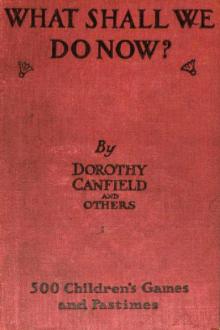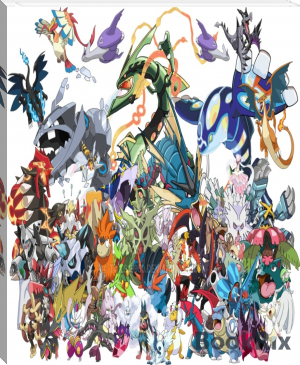What Shall We Do Now?, Dorothy Canfield Fisher [ebook offline reader .txt] 📗

- Author: Dorothy Canfield Fisher
- Performer: -
Book online «What Shall We Do Now?, Dorothy Canfield Fisher [ebook offline reader .txt] 📗». Author Dorothy Canfield Fisher
Adjective for a man.
The man.
What he was wearing.
What he was doing.
(Met)
Adjective for a woman.
The woman.
What she was wearing.
What she was doing.
The person he would much rather have met.
Where they met.
What he thought.
What he said.
What she thought.
What she said.
What he gave her.
What she did with it.
Where they went.
What they did.
What the consequence was.
What the world said.
Example:—
The honorable Theodore Roosevelt, who was dressed in a Moiré antique bath-towel and was eating walnuts, met coy Aunt Priscilla in a Khaki tea-gown playing with her Noah's Ark, when he would much rather have met Madame Tussaud. They met at South Hampton. What he thought was, "Here's this woman again," but he merely said, "That's a very chic costume of yours." What she thought was, "I wonder if he's seen Peter Pan," but she only said, "That's wet paint you're leaning against." He gave her a piercing glance, and she swallowed it. So they went to prison together and learned to ride the bicycle, and the consequence was they caught influenza, and the world said, "It's an ill wind that blows nobody good."
Composite StoriesAnother folding-over and passing-on game is "Composite Stories." Paper is passed round, and for five minutes each player writes the opening of a story with a title prefixed. The papers are passed on, and each player reads through as much of the story as has been written and for five minutes adds to it. And so on, until each player has written once on each paper. The papers are then passed on once more, with the result that each paper will be found to be lying before the player who began it. The next and last five minutes are then spent by each person in reading through the story and bringing it to an end, sometimes a difficult enough task. If six persons are playing and allowances of five minutes have been given, there will be at the end of thirty-five minutes six complete stories to read aloud.
Another Story GameA variety of the story game is for each player to write the name of a well-known person or friend of the family on the top of the paper, fold it over, and pass it on. This happens, say, five times, which means that when the papers are opened the names of five persons will be found on each. A story has then to be written introducing these people.
Improbable StoriesAnother story game is one in which each player attempts to tell the most improbable or impossible story. In this case the papers are not passed on, but a certain amount of time is given for the stories to be written in.
The NewspaperThis is a rather elaborate but really very easy game to play. One player, who acts as editor, takes as many sheets of paper as there are players and writes at the head of each the title of a section of a newspaper. Thus on one he will write, Paris Correspondence; on another, English Correspondence; on another, Berlin Correspondence; on a fourth, Political News; on a fifth, Our Fashion Page; on a sixth, Reviews; on a seventh, Weather Report; and so on. Each player then, for a given time, writes on the subject allotted to him, more or less in the manner of the daily press, and at the end the result is read aloud by the editor.
The plan is easily adapted to family or village life. The heading may refer to domestic matters, such as Nursery Correspondence, Kitchen Gossip, Fashions for Gentlemen (an account of father's new suit), Garden News, Village Chatter, and so on. Or, instead of a newspaper, a popular magazine may be contributed, with illustrations.
PredicamentsThis is a good game for a company of ingenious people, and it will be found that almost every one is ingenious when confronted with a difficult situation and given time to think out a solution. Every one is given paper and pencil (or this is not necessary since the solutions may be oral). Then one player starts the game by suggesting some predicament and asking the company "What would you do in such a case?" Five minutes are given for reflection, and fifteen if the answers are to be written. Then each in turn must say how he would have extricated himself from the scrape.
A few suitable subjects are given here. If you found yourself in a strange city, where you didn't know a soul, with no money and nothing you could pawn, what would you do?
If you should wake up in the night and see a burglar just entering the room, what would you do?
If you should look out of your school-room door and see smoke and fire in the hall, what would you do?
If you should be in a foreign country, not able to speak the language and wanted to order a room and breakfast, what would you do?
TABLE AND CARD GAMES TABLE AND CARD GAMES Card Games and OthersCard games proper, such as Bezique and Cribbage and Whist, do not come into the scope of this book. Nor do games such as Chess, Draughts, Halma and Backgammon. It is not that they are not good games, but that, having to be bought, their rules do not need enumerating again. The description of a few very old and favorite games with cards, and one or two new ones, is, however, given, because they can be made at home.
Letter GamesOn page 178 will be found the simplest letter game. Letters can be used for a round game by one player making a word, shuffling it, and throwing it face upward into the middle of the table. The winner is the player who first sees what it spells.
Distribute a box of letters among the players, dealing them face downward. In turn each player takes up a letter at random and puts it face upward in the middle of the table. The object of the game is to make words out of these letters. Directly a player sees a word he calls it out, and taking the letters places them in front of him, where they remain until the end of the game, when each player counts his words and the owner of the greatest number is the winner. If, however, a word has been chosen which, by the addition of another letter or so from the middle of the table, can be transformed into a longer word, the player who thinks of this longer word takes the shorter word from the other player and places it before himself. Thus, A might see the word "seat" among the letters, and calling it out, place it before him; and then B, noticing another "t," might call out "state," and adding it to A's word, take that to himself. If, however, A then detected an "e" in the middle and called out "estate" the word would be his again. These losses and reconquests form the chief fun of the game. An "s" at the end of a word, forming a plural, is not allowed.
Patience, or ThirteensMany games of "Patience" can be played as well with numbered cards as with ordinary playing cards. It does not matter much what size they are, but for convenience, in playing on a small table, they may as well be about an inch wide and two inches long, with the number at the top. Thus:—
A "Patience" set consists of four packs of cards each containing four sets of thirteen cards numbered from 1 to 13. These can be made at home perfectly well, and a little bag to hold each pack should also be made. The simplest game is to arrange the four sets in their right order. One player empties her four bags into a basket, shakes them up, and calls them out as she picks them out (at random). The others, who have the cards spread before them, then arrange them in four rows as well as may be, until a 1 is called and there is a chance to begin packing the others upon it. With inexperienced players five rows are sometimes allowed. We do not give other games of "Patience," for two reasons. One is that it is not exactly a children's game, and the other, that it is one of the games which can be properly taught only by personal instruction. Varieties of "Patience" are very numerous, and good books can be had on the subject.
SnapThere can be no real need to describe "Snap," but perhaps it may be useful to have the rules in print here in case of any dispute. A pack of "Snap" cards is dealt round, any number being able to play; and the game begins by the players taking their cards one by one from their hands and in turn laying them face upward on the table before them. If a card is turned up similar to a card already on view on the table, the player who turns it up or the player who owns the similar card cries "Snap," and the cards go to the player who says "Snap" first. As it is sometimes difficult for the players to distinguish which says "Snap" first, it is well to have an umpire. In the case of an undoubted dead-heat the game should go on as if nothing had happened. The player who won the cards gathers up also into his hand all the cards which were before him and continues the game. When a player has transferred all his cards from his hand to the table he waits until his turn comes and then takes them into his hand again. This is a very exciting moment, because, if his top card were snapped, then he would lose everything.
In good "Snap" packs there are several sets of cards which are intentionally made nearly but not absolutely alike, and it is very common to say "Snap" by mistake when one of these turns up. In that case the cards of the player who cried "Snap" are placed in the middle of the table, where they stay until some one turns up a card exactly like the top one and "Snap Centre" is called, when both the centre pack and the pack in front of the turner-up belong to the player who cried "Snap Centre." It may of course be the turner-up himself, but is very likely somebody else, because whereas under ordinary conditions only the owners of similar cards may cry "Snap," when there are cards is the middle too any one may cry "Snap Centre." (In some houses any one may cry "Snap" all through the game, but that is not the best way.)
When a player has lost all his cards he is out of the game until there are cards in the middle again, when an opportunity comes of snap-centring them and getting into play again. The game goes on until one player has all the cards.
GrabIn "Grab," a very rowdy variety of "Snap," a cork is placed in the middle of the table. The rules are the same as in "Snap," except that, instead of saying "Snap," you snatch for the cork; in the case of "Snap Centre," snatching and saying "Centre" too.
Snap Cards"Snap" cards may just as well be home-made as bought. They either can be painted, in which case you must be careful





Comments (0)